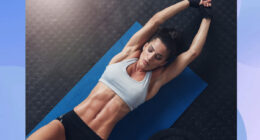You can’t afford to ignore mobility as you get older. If you can’t get in and out of the bath, or on and off the bed or the toilet, independent living is going to be difficult. But long before you reach that point, reduced mobility can be a problem. Everyone wants to be able to scratch their own back or grab a jar from the top shelf in the kitchen. This isn’t just about extending or bending your body into the required positions: you also need enough strength to be able to do stuff when you’re in them. As physiotherapists put it, mobility is your ability to move your joints actively rather than passively. Flexibility and gravity will get you down on to the toilet; it’s mobility that will get you back up again.
Look, I’m 61, with a 61-year-old’s plumbing. I think about toilets a lot, and about what the next 39 years of my life could look like. But whatever age you are, mobility should matter to you because it helps you to have fun. If you play tennis (there’s no accounting for tastes, and at least it’s not golf), it will help you reach a high ball and smash it back over the net. If you have dogs, it will help you throw a ball for them and pick up their poo. If you want to delight your grandkids with a handstand, it will even help with that.
That’s why Lucy Joslin’s mobility class at the Mission movement studio in east London is always fully subscribed, mostly by women and men decades younger than me. “It’s not very enjoyable,” Joslin admits, “but I always say it’s like medicine. You just know you’ve got to do it.”
I stumbled into Joslin’s class via calisthenics, which she coaches as a member of the Cali Kulture group of instructors. A mix of bodyweight exercises and the kind of moves that you’d usually associate with gymnastics, calisthenics is one of the most enjoyable ways to build muscle if you’re not keen on lifting weights or using the gym. But it makes big demands on your joints.
Everyone knows about pull-ups, where you hang from a bar then hoist your body up until your chin or chest comes above it; calisthenics includes variations like the muscle-up, where you add in a push-up and just keep going until your hips are level with the bar. Or there’s the back lever, which starts with you grasping some gymnastic rings, adds a back flip and ends with you hanging face down from the rings, arms twisted behind you, body in a plank parallel to the ground. Even basic calisthenics moves are hard: after months of daily exercises, I can just about manage one pull-up or half a back lever.
Having taken one of Joslin’s mobility classes, I can confirm that it’s not very enjoyable. There’s a lot of squatting, a lot of pushing hard against things, a lot of tensing muscles that are crying out for a rest. During my class, there was also a lot of groaning, not all of it from me. But I left it feeling just a little bit freer in my movements, a little more in control of my body. I’d do it again, dreading it a little but also kind of loving it.
In the meantime, here’s Joslin’s 10-part routine to stretch and strengthen hips, hamstrings, quads, chest, hip flexors, shoulders and lower back.
Use it or lose it: 10 moves to keep you mobile
Because mobility is all about end-of-range strength, these exercises are hard work and fatiguing. The full set should take about 30 mins to complete, but you can break it up if needed.
1. Hips and hamstrings
Stand with your feet shoulder-width apart, toes turned to about 11 and 1. Squat down as far as you can comfortably go, keeping your torso as upright as possible. If you’re struggling to go deep, raise each heel an inch or two by resting it on an ankle weight, a book or something similar. Bend forward to place your palms flat on the floor in front of you. Keeping your palms down, rotate your feet inwards so they are facing forwards and straighten your legs fully, sticking your bottom out to keep your back as flat as possible. You will feel a stretch in your hamstrings. (If you struggle to get your palms down to the ground, or to keep them there, place each hand on a yoga block or a dictionary.) Do this 10 times.
2. Hip flexors 1 (extension)
Kneel on something padded, like a folded towel or yoga mat. Take a big step forward with one leg so you’re in a lunge position. Keeping your torso upright, tuck your bottom under you, then sink your hips forward and down to stretch the rear leg’s hip flexor (the muscles at the very top and front of your thigh). To build strength as well as flexibility, place two yoga blocks on end either side of your front leg. Use your hands to push up from them and lift the rear knee two or three inches off the ground. Then the difficult bit: raise both hands off the blocks and hold the position for five seconds. (If you can’t manage this, maybe because you’re wobbling, keep just your fingertips on the blocks, or even just one fingertip per block.) Do this twice for each leg.
3. Hip flexors 2 (flexion)
Sit on the floor, legs wide, but not uncomfortably so. Place a block or a book on the inside of each ankle. Trying not to lean back too much, put your hands down in front of you, so that your splayed fingertips are taking just a little of your weight. Keep your legs straight and lift both feet up and over the blocks, before lowering so they just touch on the floor inside them. Immediately lift them up and over again, back to the starting position. This may be extremely hard. To make it easier, lean back, put your hands down either side of just one leg and lift just that foot up, over the block and back again. Then repeat on the other side. However you do it, repeat until each foot has moved up, over and back again 10 times. If you’re doing this correctly, you’ll feel it in your hip flexors rather than your quads. If necessary, lean a little further back.
4. Shoulders/hips/chest
Sit on the floor, legs straight out in front of you. Place your palms down on the floor next to your hips. Straighten your arms to lift your bum off the floor then swing your hips back so your feet slide towards you and your bum pushes up and out behind you. (If you struggle to get enough height, place a block or book beside each hip and push up from this.) Hold for 10 seconds.
Keeping your bum in the air, bend your knees to put the soles of your feet on the floor and raise your hips and knees to the ceiling, pushing your chest and neck back so you end up in a reverse table top position. Hold for 10 seconds. Return to the previous position and hold for another 10 seconds. You can make this harder by trying to lift one leg off the floor for five seconds, and then the other – but be sure to keep them straight.
5. Upper arms and chest
Kneel or stand in front of a table or window sill, with both elbows resting near the edge, shoulder-width apart. Step or shuffle backwards until your back is flat and your hips are directly above your knees. Control your ribs so they don’t splay. Clasp your hands together, still reaching up towards the ceiling (to make this more challenging, hold a block, book or broomstick). Now pull your shoulder blades apart and drive your chest towards the ground. Hold for 30 seconds. Repeat.
6. Shoulders 1
Lie on your belly, feet shoulder-width apart, with the tops pressing into the floor. Pull your belly in and tuck your bum under to tighten your core. Stretch your arms straight out in front of you, with your hands grasping a broomstick (or similar) a little more than shoulder-width apart. Make your arms and body as long as you can. Pull your shoulder blades apart but keep reaching forward. Keeping your chin or forehead and your chest on the ground, raise the stick as high as you can – this will probably be less than 6in/15cm. Hold for 15 seconds. Then draw the stick down your back behind your head as far as you can (keeping chest and forehead on the floor) and hold for 15 seconds. Repeat, covering both positions.
7. Shoulders 2
Lie on your belly, feet apart and with your arms out in cactus position (stretched out to the sides, then bent at the elbow), so your forearms are facing forward and your palms are down. Place a block under each elbow. Hold a light weight (1kg or so) in each hand. Without moving your shoulders, slowly raise and lower the weights 10 times. Repeat three times. You can also do this one arm at a time.
8. Side body stretch
This one’s actually enjoyable. Lie on your back, arms stretched out to form a T shape, and your legs together, knees bent so your soles are flat on the floor. Then cross the right leg over the left (mid-thigh). Keeping the legs glued together, roll them over to the left, keeping the opposite arm stretched out and as close to the ground as possible. Hold for 30 seconds. You should feel a stretch down the right side of your body. Return to centre, cross the left leg over the right, and repeat to the right side.
9. Lower back
Lie on your belly, with something like a rolled yoga mat or a cushion under your pelvis and your arms in push-up position. Push your shoulders up till your arms are straight, keeping your chest and head upright. If you’re into yoga, this is a lot like cobra pose.
10. Thoracic chair twist
Sit on a chair or stool, feet and knees hip-width apart, with a right angle at the ankle, knee and hip. Place the back of the left hand on the outside of the right knee, and the right hand on the back of the chair or stool. Sit as upright as possible, with the shoulders away from the ears. Keeping the knees where they are, turn your navel, ribs, chest and finally head to the right, as if you are wringing out a sponge – pushing with the left hand and pulling with the right. Hold for 30 seconds, then repeat on the other side.




